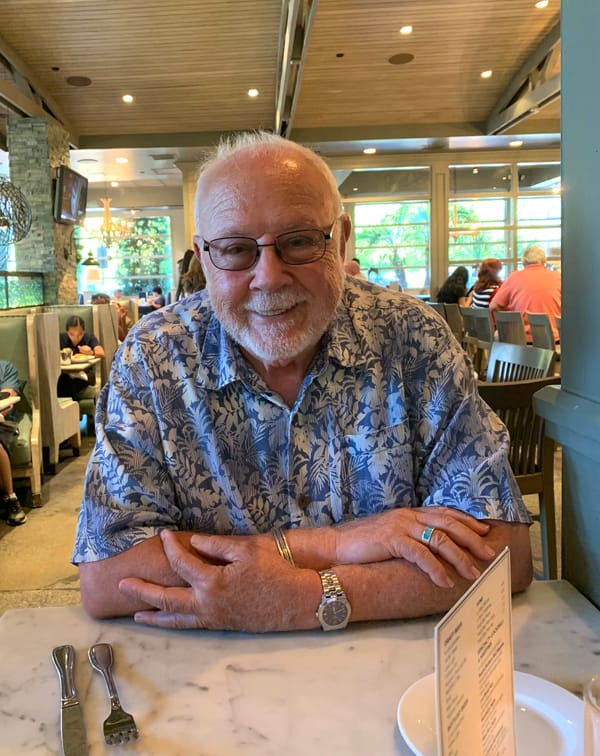Life | So, now you're 50!
So , now you’re 50!
© 2018, 2025 Vernon Miles Kerr
“Fifty, is the new thirty,” I kept telling myself that Spring in 1992. But, just saying it… “fifty,” made me cringe. I couldn’t block-out the stereotypical image of a doddering white-haired person pushing a walker equipped with tennis balls on its feet.
The US Mail that day had a curious, cubical-shaped parcel from my younger brother. Inside, wrapped in layer-upon-layer of bubble wrap and securely bound by what seemed like yards of packing tape was a humorous coffee mug with the label, “Fifty is Five Perfect Tens.” But my belly-laugh faded, and my brow furrowed at the next piece of mail: a letter from the AARP.
I wondered, “What the heck could they want?” Opening the letter, I found a shiny new AARP membership card. “I’m years from retirement and I’m not old!” I said out loud, as I emphatically tossed the letter and the card into the trash. About a week later, after noticing in the newspaper and in magazines, how many advertisers offered “AARP Discounts,” I meekly phoned AARP and asked them to please send my membership offer again.
That was twenty-six years ago, and I’m happy to report that I’ve since come to terms with the aging process and—so far— happily, I’ve been able to avoid contributing to that stereotype, for the benefit of others who may be nearing the half-century milestone. But, I must admit—with five eye operations, blood-sugar problems and dealing with mild depression at times—the journey from 1992 to 2018 has been a challenge—both to my attitude and my health.
In the 1950s, we used to have a saying about automobiles, “After 100,000 miles, they’ll nickel-and-dime you to death.” That saying was pretty true, compared to today’s superior-quality cars—which often easily cruise past the 200,000-mile mark.
The geriatric human body is a lot like those slapped-together and poorly QA’d Fifties-rides. Even barring any serious illness, after fifty, our bodies still require more and more health maintenance. But this fact is nothing to despair about, it’s natural—although admittedly, annoying at times. Part of that attitude-adjustment I mentioned has been aided by learning to focus outside myself, by making goals; not only physical goals but social and intellectual ones also.
My adult son and I have a mutual membership in a health club. Our work-out regimen, right now, focuses on strengthening and building-up endurance in our legs, with the goal of hiking the 4-Mile Trail at nearby Yosemite National Park. The “4-Mile” runs from the Valley Floor, at an elevation of 4,050 feet, to Glacier Point, a lookout at the top of the ponderous granite cliff that looms over the Valley, 3,200 feet above. As a comparison, the highway from the Valley to Glacier Point is 25 miles long.
The hike will be four miles up and four miles back, on a steep trail of mostly switch-backs. We have a long way to go before feeling confident to make this trek; but it’s focusing on goals like this that helps to avoid being discouraged by the onslaught of petty health issues along life’s trail. A set of goals allows you to think of these near-constant health incidents more as pesky mosquitos or gnats—something to be slapped away—rather than looking at them as impediments or stumbling blocks. It’s the focus on goals that allows you to maintain a good attitude and puts the inevitable trials of aging into the right perspective.
I finally did retire from a career in Software Configuration Management, at 70. After a few years of happily tending our yard and garden and making the weekly rounds of doctor appointments and trips to Costco and Trader Joe’s, I was enjoying retirement—but missing the camaraderie of the workplace and also missing getting my nose into solving challenging computer programming problems.
Then, a month ago, I was called by one of the world’s largest consulting companies to come join a project in the Midwest, at one of the major aerospace companies. With my wife’s agreement, I accepted the offer.
That goal to hike the 4-Mile has not gone away. My son and I will keep building up our legs, and one of these days I’ll fly back to the Coast and we’ll accomplish that goal. In the meantime, I now have a whole list of professional goals again, including plans to help my employer improve its delivery of software tools to engineering, and to its internal business users.
Looking forward, I realize that mobility is a blessing that many of my contemporaries no longer enjoy. As long as I have it I’ll give thanks every day, and it’ll be pedal-to-the-metal until I don’t. If it’s my fate to lose mobility, then on the day that I do, I’ll figure out some new goals; objectives that can be accomplished from flat on my back, if necessary—or from a wheelchair, or—while loping along, pushing a walker with tennis balls on the feet.
